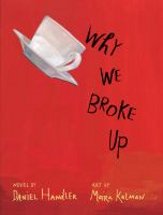Why we broke up by Daniel Handler

Ill. Maira Kalman. Egmont, 2012. ISBN 9781742970974.
(Age: 15+) Highly recommended. 2012 Printz Honor book. In a
long 354-page letter, Min writes to Ed, telling him the truth about
why they broke up. She is also giving him a box full of objects
related to reasons that they broke up. There are 'two bottle caps, a
movie ticket from Greta in the wild, a note, a box of matches, a
protractor, books, a toy truck, a pair of ugly earrings, a comb from
a motel room, and the rest of it.' (Inside cover). Each item
will be used to illustrate aspects of their heartbreaking romance
and then the box will be dumped on Ed's doorstep.
I loved this book. It was not one that I could read in one sitting.
I found myself reading a section or two, relating to the occasion
that was being described, often in reference to a film that Min
loves, and thinking about why the romance was breaking up. It was
full of teenage angst and often I felt as if I wanted to shake Min
and tell her to listen to what her friends could tell her about Ed.
However Ed, co-captain of the basketball team and dream boy for most
of the girls in the school, shines brightly. When he tells Min she
is different and is prepared to go along to the films she loves and
try different things, she is convinced they are in love. Min's
descriptions of Ed in the early stages of the romance show him to be
an amiable jock, who has a real flair for Maths. I found myself
liking him and wondering why Min couldn't see that their friends and
interests were so different that it would be virtually impossible
for a relationship to be sustained without both changing
substantially. However, the themes in Why we broke up
encompass more than the need for common interests for a relationship
to last. Handler looks at the importance of friendship,
truthfulness, keeping intimate things private and fidelity; all
things that teens need to know about relationships.
I also loved the descriptions of Min's friends, especially Al, her
best friend, who loved films, theatre productions and drinking
coffee. They were a group of people who were intelligent and well
rounded. For many teens they would provide an excellent vindication
that you don't have to go along with the popular sport-loving crowd.
Handler manages the voice of Min really well and the events were so
well described I felt they were real. I was left wondering if either
he or one of his friends at school had experienced a similar break
up. The illustrations by Maira Kalman broke up each segment of the
story and I found myself going back to them to think about their
relationship to what had happened. They certainly added to the
book's appeal.
This is a tour de force from the author who also writes as Lemony
Snicket.
Pat Pledger